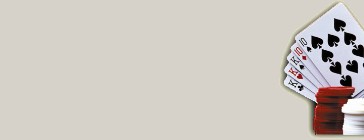|
POKER TIPS,
POKER STRATEGIES, POKER BONUS CODES, SITE REVIEWS,
HOLD EM HELP, DOWNLOADS, POKER CHEATS, POKER PRIZES,
TEXAS HOLD EM TIPS AND MORE
 |
 |
 |
 |
 |
 |
 |
 |
|
poker search
 |
PokerPlayday.com is designed to assist the online poker
community find the best bonuses, online sites, merchandise,
strategies, downloads and anything else related to poker
and Texas Hold 'em.
 |
|
|
 |
 |
 |
 |
|
|
 |
 |
 |
 |
 |
 |
 |
 |
 |
 |
 |
 |
 |
 |
 |
 |
 |
|
PSYCHOLOGY
OF LOSING |
|
|
|
taken
from an anonymous forum
thread |
How does knowing
"the psychology
of losing" help
you? You're
going to win!!
Well, there's
psychology there
too, but that's
for another
post. It helps
because if you
know what
subliminal
drivers kick in
when you lose
then you're
better prepared
to address and
combat them,
which will
decrease your
losses. I'm not a
psychologist,
but I play on
online. Enjoy!
Losing is
relative. The
psychological
effects kick in
at different
times for
different
people, based on
your tolerance
and history.
Someone with a
$1000 bankroll
who loses a $5
tournament with
a bad beat as an
isolated
incident won't
blink. The same
loss to someone
else may put
them on serious
TILT. For
instance, if you
have a $49
bankroll, that
WAS a $100
bankroll and you
need to witdraw
your money
before your wife
finds out, but
the site won't
let you withdraw
less than $50,
plus this is
your 5th "bad
beat" in a row,
etc. Then it's a
mortal lock that
psychology will
come into play.
The basic
psychological
and
physiological
reaction to
losing:
Boiled down to
it's absolute
essence, losing
Hurts! Not in an
abstract way,
but in a very
real way. It
makes your
stomach churn,
changes your
blood pressure,
constricts
thousands of
muscles and
causes physical
and mental
anguish. Throw
emotion on top
of that and you
have The
Psychology of
Losing. It's
real, we've all
felt it, and
it's no fun.
So what?
So this... when
humans
experience pain
and discomfort
we want to make
it GO AWAY!! How
do we do that?
You're sitting
in front of the
computer so you
click into
another game as
fast as
possible. The
best way to make
the pain of
losing go away
is to WIN!! And
you want to win
as quickly as
possible. Add to
that the fact
that you're
still kicking
yourself for
losing (whether
justified or
not)... How
could you play
so smart for 2
hours (at a ring
game or MTT for
instance) and
then implode so
quickly? And you
have a recipe
for disaster.
Your body wants
to feel better,
your mind wants
to prove it's
worth, your ego
wants to regain
it's
self-respect.
And maybe,
you're loses are
causing a
financial
pressure. And
it's all
relative. You
could have
started with
$100 and grown
it to $310 over
a few session or
weeks of play.
Now you're back
below $220 and
your scared to
see that number
go below $200
for no real
reason other
than ego. In
reality you're
up, but it
doesn't feel
that way.
(Alternately it
could cause an
ACTUAL financial
stress, which is
worse). So, all
this combines
into an
unstoppable urge
to keep playing.
Maybe at higher
stakes. If it
took you 3 weeks
to build that
bankroll, you
don't want to
have to start
another 2 week
process because
you had a bad
few hours. So
patience and
reality go out
the window and
you increase the
stakes to
"recover
faster". Or
start
Multi-tabling
where you
weren't before.
When the loss of
a single hand
triggers this
response, then
that's what most
people see as
"going on tilt".
Does any of this
sound familiar?
If not it's
because you're
playing with
points and not
money or have
been playing for
only 30 minutes.
It happens to
everyone at
every level:
Micro,
Tournament, High
Stakes, etc.
The important
thing to
understand is
that the
symptoms you
feel when you
lose are out of
your control.
They are as
physiological
and automatic as
your heart
beating or
sneezing. The
other important
thing to
remember is that
good poker play
requires
PATIENCE,
ABSTRACT
THINKING, and A
NEUTRAL TO
POSITIVE
OUTLOOK. You
will lose money
if you are in a
hurry,
distracted by
your own body
and worried.
SO WHAT DO YOU
DO?
1. KNOW THYSELF.
Understand when
this kicks in
for you. You
could lose 5
tournaments in a
row, but your
expectations are
to win 1 out of
6, and you have
the bankroll and
history that
makes it all
"normal". This
may not kick in
until you lose
the 6th
tournament. Or
you may expect
to win money 2
days out of 3
playing limit,
so it doesn't
kick in when
you've had a few
hours or a day
of negative
income. But you
need to know
what your
expectations are
regarding losing
and "know
thyself". When
you feel the
first tinge of
physical or
emotional
response to
losing then the
affects above
are kicking in.
The solution is
to stop playing
until you get
yourself back
under control
(more on that
below).
2. KNOW YOUR
EXPECTATIONS.
(This is a
secret to life
in and of
itself, so take
note.) I don't
know the secret
to happiness,
but I DO know
the secret to
unhappiness. It
is UNFULFILLED
EXPECTATIONS.
You expect your
life to "change"
and get great
when you
graduate high
school, and then
it doesn't.
You're unhappy.
Why? No reason,
everything is
fine, you aren't
being shipped
off to a prison
work camp, you
have food and
friends and
activities. But
reality didn't
meet your
expectations and
you have
Unrealistic
Unhappiness. It
happens for
women post
marriage. They
expected this
married fantasy
bliss, and it's
not there after
about the first
month. They get
unhappy. Why?
They're married!
They have a
handsome
husband, new
apartments...
etc. Nothing is
REALLY wrong,
but they have
UNFULFILLED
EXPECTATIONS. So
they are
unhappy.
What are your
expectations?
Are they
realistic? Do
you expect to
lose? You should
not expect to
always win. Do
you expect to be
Mr. Poker with
only 3 years
experience?
(yes, it takes a
long time to get
as good as you
expect! 3 years
is nothing.) If
you're new to
poker, you
really need to
examine your
expectations.
May I suggest
that you expect
to pay a
"learning tax"
and make the
most of what you
learn. If you
break even, or
win then it's a
bonus. But, if
you put your
mind and effort
into it, then
you will
eventually start
collecting other
players'
"learning tax".
AS you get
better that
income increases
and you can make
good money if
you want. Or you
can play
break-even poker
- which is free
excitement and
entertainment.
But, have your
expectations
match reality.
Because if you
don't, the PAIN
RESPONSE will
kick in and
you'll "go on
tilt" - which is
another way of
saying you will
sucumb to the
Psychology of
Losing.
The solution to
this is to Ajust
Your
Expectations
(more on this
below)
How to Do what
you need to do
to reverse the
Psychological
Effect of
Losing.
There's more
that could be
said above, but
these 2 points
are the main
points to
address in this
post. So here
are some
suggestions and
thoughts on how
to execute a
recovery
strategy.
1. Stop Playing
If you can't
turn off the
computer and
walk away then
you have a
problem. And you
should see it as
a problem. You
don't have to
rush off to a 12
step meeting.
But if your
poker is
affecting your
life and
relationships
with others in a
negative way,
your job, life
finances,
causing
depression, etc.
Then you
probably should
get professional
help. Poker
isn't that
important!!
(If you have
this problem
then you
probably already
suspect it and
don't want to
face it. Let me
just say this,
and if it sounds
like a public
service add,
then it does. If
you acknowledge
to yourself that
you have a
problem and
realize that
your life and
family are more
important than
the problem,
then you will
overcome it. You
just need some
professional
help and
counselling. You
will live the
life you want
and not a life
of cyclical pain
and
self-destruction.
You can have
that great life
you imagine
without poker.
Guranteed!)
FOR MOST OF US
THOUGH, the
problem isn't a
life problem.
It's an issue of
minimizing our
losses and
increasing our
positive poker
sessions. So
here are some
things you can
do.
Again, turn off
the computer.
Call the session
done! So you
lost?? OK.
Accept it. Put
it in
perspective. Did
losing give you
cancer? NO! Did
it make your
wife leave you?
NO! Did it cause
your beautiful
lawn to sprout
weeds? NO! OK.
There's no Real
Damage!! There's
no Real
Danger... Your
body is
registering a
Danger Response
to an imagined
danger.
Understand and
accept it.
Physical
separation from
the stimulus
(i.e. the game)
will let your
body calm down,
will let your
mind start to
digest what
happened, and
will keep you
from blowing the
money you have
left in a vain
and fruitless
attempt to
"recover". You
can't recover
the money Right
Now. But you can
recover yourself
right now, by
walking away.
Do something
else. Something
physical is
best. It will
disperse the
physical effects
more quickly and
occupy your
mind. Clean
something!!!
Yea! That'll
also make the
wife happy and
you'll get
satisfaction
from that.
Imagine how much
your wife will
LOVE the fact
that you play
poker if when
you win the
family gets
Money and when
you lose the
house gets
Clean?? That's a
win-win!! And
it's a win-win
for you. When
you win money
you get warm and
fuzzy feelings
of power and
ego, and when
you lose you get
SEX!!!
You could also
take a walk, mow
the grass, clean
the gutters,
take a drive
with the top
down (I have a
Jeep) or the
windows open.
Get some fresh
air! Play with
the kids!!
They've been
waiting for
"Daddy to get
off the
computer" for 3
hours. They'll
love it.
Don't watch a
movie or read a
book. You'll
keep stewing and
they aren't as
effective as
something
physical.
What if your
loss was late at
night? Take a
piss (you've
been waiting
until a break),
take a sleeping
pill - not the
whole bottle
haha - and go to
bed. Honestly,
take a sleeping
pill. They
aren't
addictive, you
have work in the
morning and you
don't need to
miss sleep
thinking about
why you reraised
AI with 66
against a
reraiser with
AA. You'll feel
better in the
morning.
If you want to
play more the
same day, then
you need to take
a good, long,
physical break.
Do something
that will make
you feel good
about life. Work
out! You'll help
your health. Go
out to eat at a
nice restaurant.
You'll help your
outlook on life.
Etc. But, if you
aren't 100%
relaxed, 100%
patient and 100%
prepared to play
poker the way
you know you
should and feel
you can, then
you're not ready
to play yet.
What if you're
in the Middle of
a Tournament??
If you can click
"deal me out",
recoginize the
symptoms and do
what you can to
dissipate them.
Take as long of
a break as
possible.
Recognize that
YOU MIGHT LOSE
AND THAT'S OK!!!
Come to grips
with the
prospect of
losing and
decide that it's
not the worst
thing in the
world. Then
decide that if
you are going to
lose it's not
going to be
because you went
on Tilt. You're
going to invest
your time, skill
and energy to
the best of your
ability until
the last hand.
If you do lose,
you won't feel
as bad as if you
tilted out!!
Enuf said?
Recognize your
response to
losing is
physical and
psychological in
ways you can't
"decide" away or
ignore. You have
to Do something
else.
If you've taken
a particularly
bad loss or lost
your entire
bankroll, you
may need to take
a longer break.
Days, weeks,
even months. If
you have money
online it'll
still be there 6
weeks later -
which is more
than can be said
if you play on
tilt. Take some
time to study
your play, read
a book or two,
learn more,
change your
game. Re-read
the book that
helped you learn
to play well in
the first place.
Take notes.
Poker won't go
away during your
break. There
will probably be
1000 new fish on
the site when
you return and
the shark who
spanked you
around may have
moved to another
site or higher
stakes. Don't
return to
playing until
you feel you
have the skills
and mentality
you need to win.
2. Adjust Your
Expectations
I'm posting this
in the
beginner's area.
If you're a
beginner or you
haven't "learned
poker" then you
really need to
adjust your
expectations. I
don't care what
limit your
playing, there
are some players
there who have
studied poker,
know it like the
back of their
hand, and have
been playing for
years and
years!!! The
higher the
stakes,
generally, the
more experienced
the players.
That's not a bad
thing! You are
getting your
money's worth
for your
"learning tax".
If you think you
have a 6th
sense, a "feel
for the game",
you can "spot
weakness"
naturally, etc.
You don't. I'm
being frank. No
one does. Those
feelings aren't
feelings, they
are based on
experience,
study, knowledge
and statistical
analysis. When
all that becomes
innate then it
looks like
"feel". But I
doubt any highly
successful
player will say
they have a
"natural talent"
other than their
talent to learn
and their
experience and
commitment to
playing good
poker. It's easy
to feel that way
when you're
winning. But
there's always
an element of
luck, even
playing AA
there's luck.
You choose this
time to go AI
and someone
calls with KK
and you hold up
to win.
Statistics said
you would
probably win.
But it was LUCKY
that someone had
2nd best hand
and a
willingness to
call your AI
bet. We increase
our chances by
learning and
experience.
One way to
adjust
expectations is
to keep records.
Past history
DOES predict
future results,
all else being
equal. Most
people don't
understand that
past records for
thousands of
hands is
required. So
they see
streaks. But
they are just
small portions
of a correct
statistical
sampling. Flip a
coin 30 times
and it may come
up heads 20
times. Flip it a
million times
and the
difference
between heads
and tails will
be will within
any margin of
error. So don't
interpret small
scale changes as
trends. Adjust
your
expectations.
When you haven't
played thousands
of hands, then
HAVE NO
EXPECTATIONS!!
You're still
building your
statistical
baseline to base
any expectations
on. You can
study your hands
and your play
against
"recommended"
play and learn
how to play
better in the
short term.
There are plenty
of helps
regarding that
here and
elsewhere.
Adjust your
monetary
expectations. No
one WANTS to
follow the
bankroll
management
advice on this
site and
elsewhere. Just
understand that
if you don't
then you're
going to see
some swings that
look scary and
can take your
entire bankroll.
Don't EXPECT to
be unique in all
the world of
Poker. You can't
play 50% of your
bankroll on any
given day and
not suffer the
natural and
unavoidable
consequences of
that move.
We all see
ourselves as
unique, special,
talented.
There's nothing
wrong with that,
except that when
you're talking
about Poker
you're playing a
game of
statistics,
skill and
experience. You
can't change
statistics. If
you change your
skill and
experience
(generally over
a long period of
time) then you
can become
unique, special
and talented.
It's like that
saying "ALL MEN
ARE CREATED
EQUAL, BUT SOME
OF US OUTGROW
IT".
Do you expect to
be able to play
6 hours a day,
when your family
and other
obligations
don't allow it?
Adjust your
expectations!
There are plenty
of other
"expectations"
that need
adjusting.
Here's the
bottom line (in
poker and in
life). If you
are UnHappy,
then you need to
look at what
your
expectations
Were, what
Actually
Happened, and
either adjust
your
expectations to
match reality or
take the action
necessary to
adjust reality
to match your
expectations. If
you hate your
job it's because
you expected....
whatever. Either
make that
happen, adjust
your
expectations or
change jobs.
Same with poker.
Knowing where
you fit in the
poker spectrum
when it comes to
skill,
experience and
your chosen
game/limits,
will also help
you understand
and deal with
losses. They
will also help
you know when,
where and how
you need to
improve. If
that's your goal
then losing is a
positive. If you
didn't lose how
else would you
know your
weaknesses and
know where to
spend your
energy.
Can you turn a
loss into a
positive
experience? I do
it all the time.
I'll be heads up
in a tourney and
have my hat
handed to me by
a skilled player
= more skilled
than me by a
mile. I'll watch
everything he
does and learn.
I'll make notes.
I'll replay it
in my mind. I'll
add his tricks
to my bag and be
grateful for the
experience.
Let's say I
don't make it in
the money and
the same thing
happens (that's
losing), I'll do
the same thing.
|
|
|
SUMMARY
1. Not every
loss activates
the Psychology
of Losing
reaction. Know
what triggers it
with you and
learn to
recognize the
symptoms.
2. Adjust your
play to reduce
the opportunity
for this loss
reaction to
happen often (if
possible)
3. When it
happens,
recognize it and
take steps to
dissipate it. If
you're in the
middle of a
tournament and
can't just turn
off then adjust
your
expectations
very quickly,
take a few hands
off, and recover
the best you
can. You may
lose anyway, but
you'll give
yourself a
better shot than
you would have
had otherwise.
4. If poker
affects your
family, life,
finances in a
serious way then
get professional
help.
5. Physical loss
reactions
require physical
actions to clear
up. Stop playing
and do something
else.
6. Know your
game, know your
circumstances
and adjust your
expectations to
match.
Finally, if
you're not
having fun over
the long run,
then why do it?
If you love
playing poker,
life's too short
to deny yourself
that excitment.
And if it just
seems like a
constanst
struggle with no
upside, then
life's too short
to waste your
time doing it!!
Good luck and
happy playing!
 |


|
|
|
|
|
|
|
|
Home
Poker Tips
Poker Reviews
Downloads
Bonus Codes
Poker Gifts
Poker
Merchandise Newsletter
Free Poker Drawing
Contact Us
Affiliates
Poker Links |
|
|
|
 |
 |
|
COPYRIGHT (C) 2006, PokerPlayday. ALL RIGHT RESERVED.
|
|
 |
 |
 |
 |
 |
 |
 |
 |
 |
|
 |
 |











